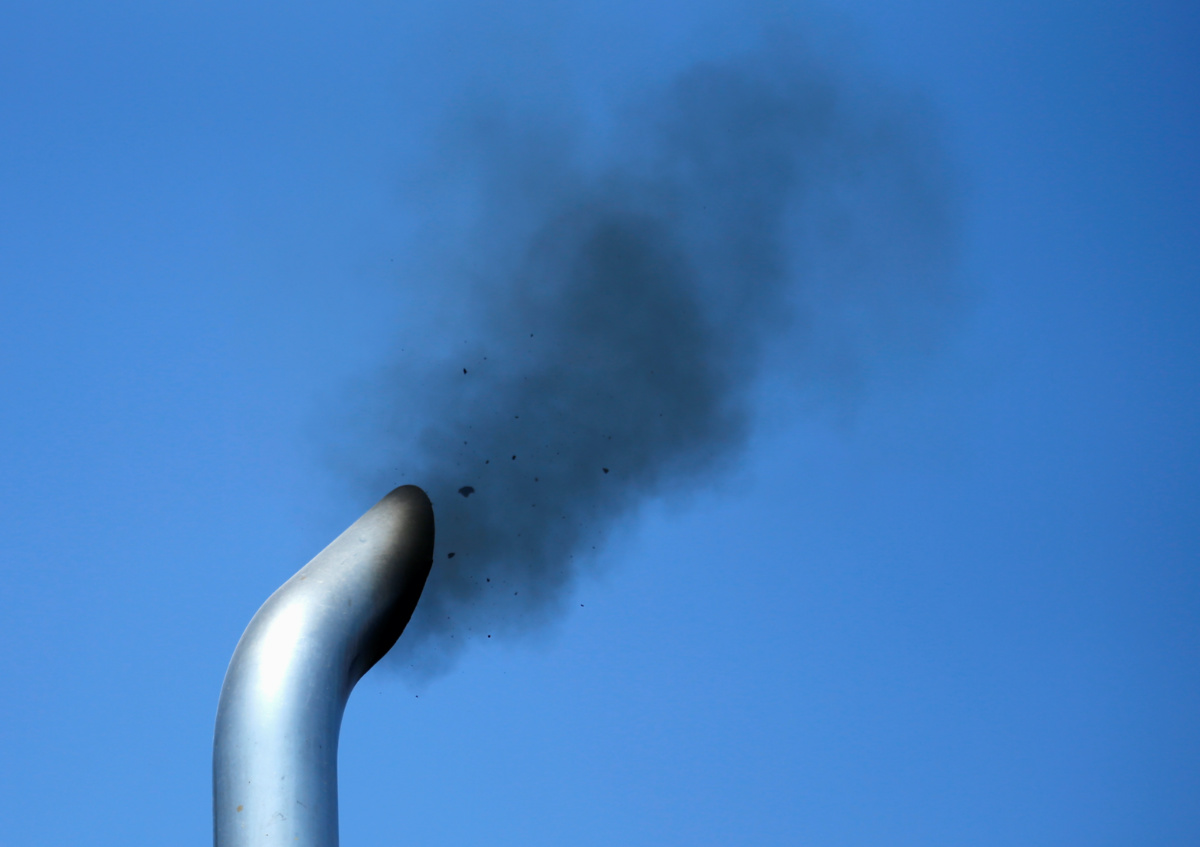Zurich, Switzerland
Reuters
The pace of climate change has not been slowed by the global COVID-19 pandemic and the world remains behind in its battle to cut carbon emissions, the United Nations said on Thursday.
The virus-related economic downturn caused only a temporary downturn in CO2 emissions last year and it was not enough to reverse rising levels of greenhouse gases in the atmosphere, the World Meteorological Organization said.

A truck engine is tested for pollution exiting its exhaust pipe near the Mexican-US border in Otay Mesa, California, on 10th September, 2013. PICTURE: Reuters/Mike Blake/File photo.
“There was some thinking that the COVID lockdowns would have had a positive impact on the…atmosphere, which is not the case,” WMO Secretary-General Petteri Taalas said at a news briefing.
The world in 2021 was missing the mark of building back sustainably from the COVID-19 crisis and “not going in the right direction,” Taalas said.
Reduction targets for emissions are not being met and there is a rising likelihood the world will miss its Paris Agreement aim of reducing global warming to 1.5 degrees Celsius above pre-industrial levels, the WMO said in its United in Science 2021 Report.
“This is a critical year for climate action,” UN Secretary-General Antonio Guterres said in a statement, and the results were an “alarming appraisal of just how far off course we are.”
“This year has seen fossil fuel emissions bounce back, greenhouse gas concentrations continuing to rise and severe human-enhanced weather events that have affected health, lives and livelihoods on every continent,” he said.
Concentrations in the atmosphere of the major greenhouse gases – CO2, methane and nitrous oxide – continued to increase in 2020 and the first half of 2021, the UN said.
The average global temperature for the past five years was among the highest on record, estimated at 1.06 degrees Celsius to 1.26 degrees Celsius above pre-industrial levels.
There is now a 40 per cent chance that the average global temperature in one of the next five years will be at least 1.5 degrees Celsius warmer than pre-industrial levels, the report said.
“Unless there are immediate, rapid and large-scale reductions in greenhouse gas emissions, limiting warming to 1.5 degrees Celsius will be impossible, with catastrophic consequences for people and the planet on which we depend,” Guterres said.
The United in Science 2021 report presents the latest scientific data and findings related to climate change.
WMO’s Taalas compared the dramatic upsets to daily life caused by the COVID-19 pandemic to the more moderate changes required to mitigate climate change and stave off much more dire consequences.
“If we fail at climate mitigation, we would have a permanent problem for at least hundreds or even thousands of years,” he said. “The…economic, human wellbeing effects would be much more dramatic than this COVID pandemic.”
Earlier, Guterres said a critical meeting on climate change later this year in Scotland is at risk of failure due to mistrust between developed and developing countries and a lack of ambitious goals among some emerging economies.
The UN COP26 conference in Glasgow aims to wring much more ambitious climate action and the money to go with it from participants around the globe. Scientists said last month that global warming is dangerously close to spiralling out of control.
“I believe that we are at risk of not having a success in COP26,” Guterres told Reuters in an interview at UN headquarters in New York on Wednesday. “There is still a level of mistrust, between north and south, developed and developing countries, that needs to be overcome.”
“We are on the verge of the abyss and when you are on the verge of the abyss, you need to be very careful about what the next step is. And the next step is COP26 in Glasgow,” he said.
Guterres and Britain’s Prime Minister Boris Johnson will on Monday host a meeting of world leaders on the sidelines of the annual high-level week of the UN General Assembly in a bid to build the chances of success at the climate conference, being held from 31st October to 12th November.
“My objective and the reason why we are convening a meeting on Monday is exactly to build trust, to allow for everybody to understand that we all need to do more,” Guterres said.
“We need the developed countries to do more, namely in relation to the support to developing countries. And we need some emerging economies to go an extra mile and be more ambitious in the reduction of air emissions,” he said.
Monday’s meeting, which will be both virtual and in-person, will be closed to allow for “frank and open discussions” on how to deliver success in Glasgow, said a senior UN official, speaking on condition of anonymity.





